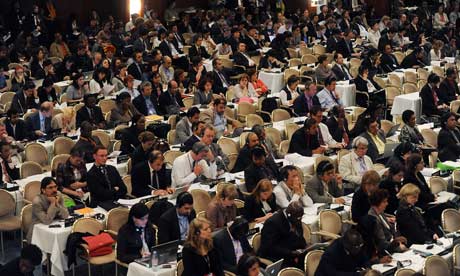America will never sign up, but the EU will if China does, which is unlikely if Africa doesn't. No nation wants to go it alone but Russia doesn't want to do anything, and the poor want the rich to absorb all the costs but the rich will only agree to sign if the poor do more.
Yes, I'm talking about the great game of the UN global climate talks, which resume in a few weeks' time in Panama - the last gathering before the big annual meeting, this year in Durban, South Africa, at the end of November.
But now a group of German academics at the Potsdam Institute for Climate Impact Research has used game theory - the mathematics behind strategic behaviour of countries - to propose a way though the myriad impasses for negotiators.
Jobst Heitzig, lead author of a study to be published shortly in the National Academy of Sciences, suggests that what is basically going wrong in the talks is that "free-riding" countries are undermining other countries that want to act on behalf of humanity.
These are the nations – take a bow America, Russia, Canada – that continue to emit CO2 without restraint but are happy to enjoy a more stable climate paid for by other countries who are spending billions to cut carbon emissions.
The academics' theory purports to prove, mathematically, that the talks would move forward faster and more successfully if countries agreed to penalise each other if they missed emissions reduction targets.
That way, Heitzig argues:
"Long-term international co-operation to protect the climate becomes more probable. If one country emits more CO2 within a commitment period than agreed, then the other countries could deviate from their agreed targets to a particular degree in the following commitment period. Then the free-riders could not count on others fulfilling climate protection obligations for them. They would have an incentive to make their own contribution."
In the short term, he says, the balance of emissions could worsen, but in the long term it would stabilise.
Like all theories, though, the game theory analysis has been based on assumptions, and here's why it seems unrealistic. Firstly, it assumes that all countries will act in a fundamentally rational way. Secondly, it assumes that the players all share the basic aim of climate protection.
And, as we all know, any country that does not take climate change seriously cannot, by definition, be acting rationally. And secondly, the selfish behaviour of countries we've seen in previous years of climate talks shows that the basic aim of cutting emissions stabilising the climate has been forgotten in the politics of the UN process.
It's back to the drawing board, I fear.

